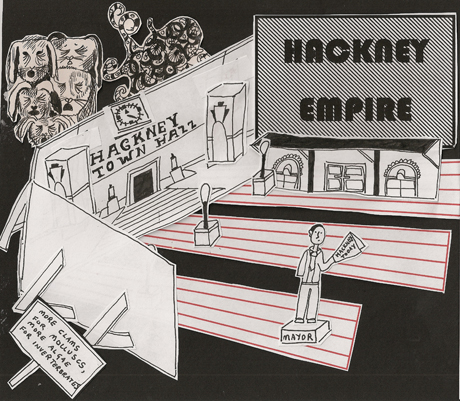Leader: Hackney makeovers and council make-believe

Hackney Council: maintaining the facade? Illustration: Caroline Christie and Bethany Lamont
At a recent Prime Minister’s Question Time (2 November), the Labour leader Ed Miliband accused the Prime Minister of being a master of the “fanfare announcement”. The more critical among us might say the same of Hackney’s directly-elected mayor, Jules Pipe.
Indeed, the council continues to do its utmost to keep up appearances to local residents and the wider world: cleaning away much-loved street art, working to get rid of betting shops and strip clubs (without addressing the underlying issues), switching from green to brown energy and failing to inform Hackney residents properly, banning authors it doesn’t like from giving talks at libraries, preventing Ronan Bennett from filming the Channel 4 -commissioned Top Boy on Hackney’s estates, and so on.
As well as saying how “appalled” he was by the riots, the Mayor was keen to emphasise that by the next day, Hackney streets were such that it appeared as if the riots had never happened: “The council’s cleaners were on the streets throughout the night and had cleared away all the debris, apart from a few burnt out cars, by 7.30am and I would like to pay tribute to them for their hard work.
“I would also like to thank the several hundred residents and volunteers who turned up at Hackney Town Hall this morning offering to help clean up the borough … Many were keen to go and help in other parts of London when it was clear the clean up in Hackney was already complete.”
So despite the arguably complex causes of the disturbances (the shooting of Mark Duggan, police ‘misbehaviour’, government cuts, social inequality), the ‘good news’ narrative from the council to residents and the outside world continues, as part of its vigorous efforts in ‘reputation management’, ‘place branding’ and ‘destination marketing’.
Hackney Today is produced by the Town Hall’s communications department which has an annual budget of over £2.3m. Last month, it won an award for ‘newspaper or magazine of the year’ at the Chartered Institute of Public Relations Local Public Services Awards. It is perhaps telling that the council did not make the shortlist in other categories including ‘consultation excellence’ and ‘PR on a shoestring’.
You will find no negative stories about the council in Hackney Today. It’s full of pictures of smiling residents and platitudes about the Olympics – harmless enough, but there is something distinctly unreal about it all. Like a Potemkin village, it portrays a rosy view and serves to underline how obsessed this council is with its appearance.
The Mayor insists safeguarding frontline services is his priority. So why has his council been lavishing money for so long on a department whose function is the photoshop retouching of the borough?
Councils across the land have been far too eager to embrace such cosmetic exercises. Which means that scrutiny by local newspapers remains important for the functioning of our democracy.
